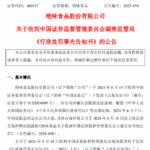The announcement information shows that after investigation, Xiangxue Pharmaceutical was found to have committed the following illegal acts: failing to recognize losses from the demolition of villas as required, resulting in false entries in the 2019 annual report; and failing to disclose related-party non-operating fund occupation as required, leading to major omissions in the relevant annual reports.
Another listed pharmaceutical company and its actual controller have had their penalty results announced.
Recently, Guangzhou Xiangxue Pharmaceutical Co., Ltd. published an “Announcement on the Company and Relevant Parties Receiving the ‘Administrative Penalty Decision'” on the Shenzhen Stock Exchange, stating that the company and relevant parties have recently received the “Administrative Penalty Decision” (No. [2025] 12) issued by the Guangdong Bureau of the China Securities Regulatory Commission.
According to the announcement, the Guangdong Bureau conducted an investigation into Xiangxue Pharmaceutical and Wang Yonghui for information disclosure violations, which has now been concluded.
Based on the announcement, Guangzhou Xiangxue Pharmaceutical Co., Ltd. was ordered to make corrections, given a warning, and fined 6 million yuan; Wang Yonghui, the actual controller of Xiangxue Pharmaceutical and then chairman and general manager, was given a warning and fined 10 million yuan, including 3 million yuan as the directly responsible supervisor and 7 million yuan as the actual controller; Lu Feng, then CFO of Xiangxue Pharmaceutical, was given a warning and fined 2 million yuan; Huang Bin, then director, board secretary, and deputy general manager of Xiangxue Pharmaceutical, and Xu Li, then board secretary of Xiangxue Pharmaceutical, were given warnings and fined 1 million yuan each.
Based on the facts, nature, circumstances, and social harm of the parties’ illegal acts, and in accordance with the first paragraph of Article 193 of the 2005 Securities Law, the Guangdong Bureau decided to give Chen Binghua, then CFO of Xiangxue Pharmaceutical, a warning and fine him 150,000 yuan.
Case Background
Announcement information shows that after investigation, Xiangxue Pharmaceutical was found to have committed the following illegal acts: failing to recognize losses from the demolition of villas as required, resulting in false entries in the 2019 annual report; and failing to disclose related-party non-operating fund occupation as required, leading to major omissions in the relevant annual reports.
Reviewing the case initiation process, on September 30, 2024, Guangzhou Xiangxue Pharmaceutical Co., Ltd. and its actual controller Wang Yonghui received the “Case Initiation Notice” (No. CSRC Case Initiation 0062024028 and No. CSRC Case Initiation 0062024029) from the China Securities Regulatory Commission. Due to suspected information disclosure violations, the CSRC decided to initiate cases against Xiangxue Pharmaceutical and Wang Yonghui in accordance with the Securities Law of the People’s Republic of China, the Administrative Penalty Law of the People’s Republic of China, and other laws and regulations.
On the same day, according to a Xiangxue Pharmaceutical announcement, Zhu Weibin, vice president and CFO of Xiangxue Pharmaceutical, submitted his resignation, stepping down from all positions at the company for personal reasons. His original term was set to expire at the end of the ninth board of directors’ tenure.
On March 21, 2025, Xiangxue Pharmaceutical received the “Advance Notice of Administrative Penalty” (Guangdong Securities Penalty No. [2025] 5) from the CSRC. On August 16, 2025, the “Administrative Penalty Decision” was officially disclosed, marking the case’s transition from the investigation phase to the execution phase, a process that took nearly a year.
According to the CSRC investigation, the company’s violations can be traced back to 2016.
The 2019 annual report contained false entries. That year, five villas owned by the company on Guangzhou Bio-Island were demolished, but the company failed to recognize the related construction-in-progress losses as required, resulting in an overstatement of profit by 53.83 million yuan for the year, accounting for 45.98% of the total profit for the period. This deliberate concealment of asset losses directly distorted the company’s profitability that year, seriously misleading investors.
Additionally, the long-term concealment of related-party non-operating fund occupation constituted a major omission.
From 2016 to 2020, the company transferred funds to controlling shareholder Kunlun Investment and other related parties under the guise of purchasing trust wealth management products and cooperative operations, using the funds for purposes such as repaying loans and acquiring equity. The cumulative actual amount



